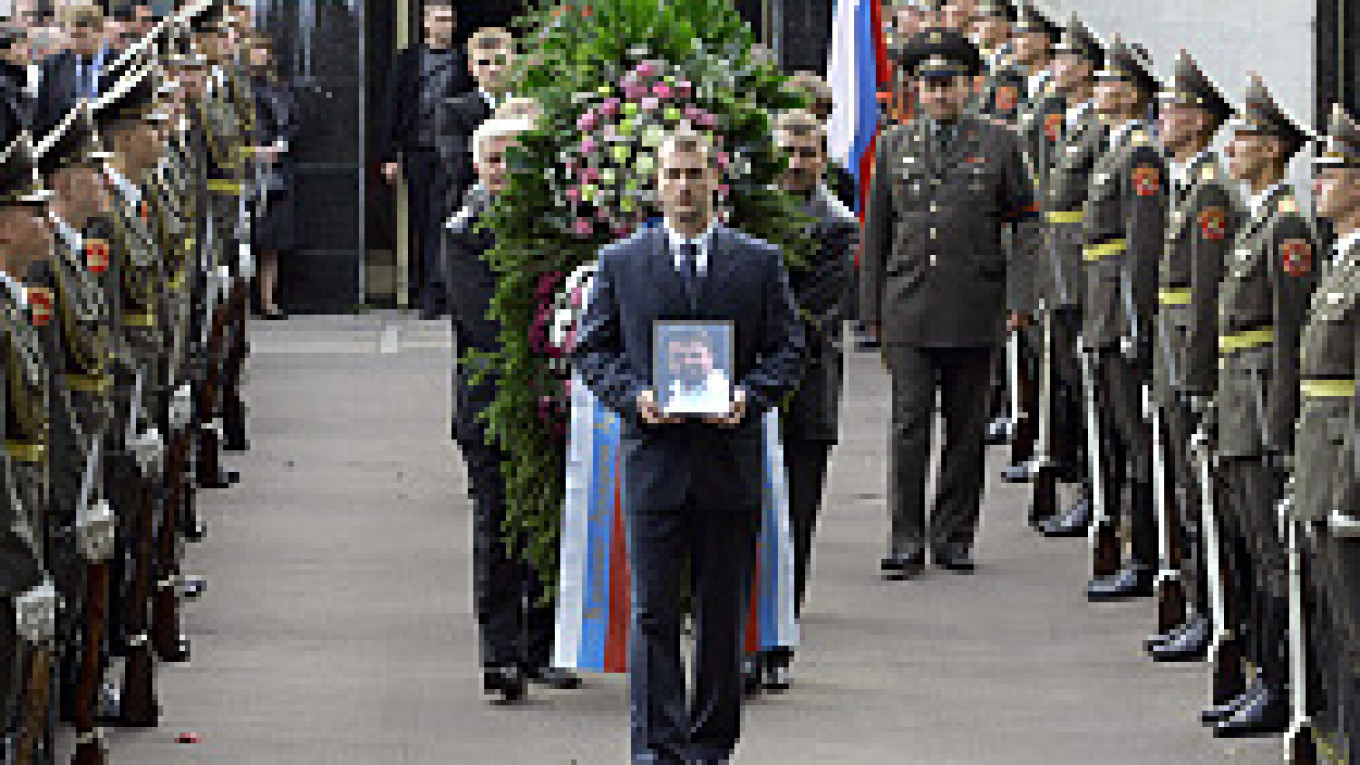Kozlov, who died of gunshot wounds early Thursday, oversaw the Central Bank's effort to shut down hundreds of banks that laundered money and serviced corrupt companies.
"Unfortunately, banking institutions continue to be used for criminal ends," Putin told senior government officials during an emergency meeting in Sochi devoted to economic crimes.
"We are seeing the laundering of billions of rubles every month within the country," Putin said in comments posted on the presidential web site. "We are seeing the movement of enormous financial resources abroad."
Central Bank Chairman Sergei Ignatyev assured Putin that the crackdown on dirty banks would continue. The meeting was also attended by Prosecutor General Yury Chaika, Interior Minister Rashid Nurgaliyev and Alexander Bortnikov, the deputy head of the Department of Economic Security of the Federal Security Service.
Putin said the murder of Kozlov -- the highest-profile killing during his presidency -- was a result of the "intensifying situation in the battle against criminal activity in the economic sphere."
The president said the money laundered through dirty banks was used not only to pay salaries under the table, but also to "pay for the services of government officials," that is, for "enormous bribes." Laundered money is also used to fund terrorist activity and the drug trade, he said.
Putin called for tightening the regulations that govern bank-client relations and for the creation of an interagency working group on economic crimes that would include officials from the Central Bank, the Prosecutor General's Office, the Federal Tax Service, the Interior Ministry, the FSB and financial intelligence agencies.
Finance Minister Alexei Kudrin said Saturday that the Central Bank had revoked the licenses of 79 banks since the beginning of 2005, most on suspicion of money laundering or supporting terrorism, RIA-Novosti reported.
Most recently, a bank allowed a client to withdraw funds in late August after its license had been revoked, Kudrin said, adding that Kozlov had personally overseen the closure of that bank.
Kozlov, 41, and his driver, Alexander Semyonov, 54, were shot Wednesday evening. The driver died on the spot. Kozlov was rushed to a hospital, where he died after a lengthy operation.
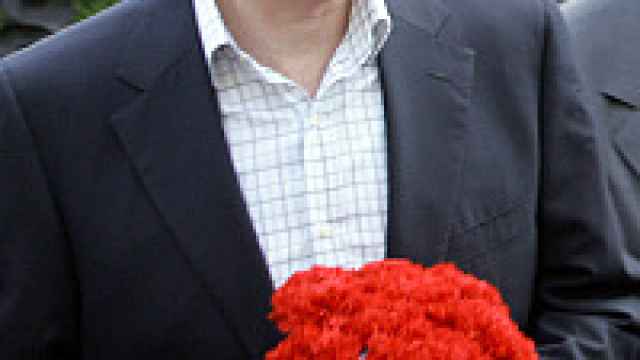 Dmitry Lovetsky / AP UES CEO Anatoly Chubais carrying flowers at the funeral. | |
"I thought those days were gone for good, but it turns out they're not," Bashkirov said.
Hundreds of Kozlov's friends and colleagues gathered for the wake at Moscow's Central Clinical Hospital on Saturday. Those present included Ignatyev, Economic Development and Trade Minister German Gref, Deputy Finance Minister Sergei Shatalov and Arkady Dvorkovich, the head of the Presidential Experts' Council.
"[Kozlov's] service to the state undoubtedly upset the plans of many people who made their money in the illegal economy," Gref said in comments reported by Reuters.
Ignatyev apologized to the gathering for allowing the murder to happen, Mayak radio reported. Kozlov was buried at the Troyekurovskoye cemetery in western Moscow.
Chaika said in televised remarks that the Prosecutor General's Office was working overtime on a number of scenarios, although he said the assassination was mostly likely linked to Kozlov's role at the Central Bank.
Some 20 prosecutors are working on the case, Kommersant reported Saturday.
The City Prosecutor's Office on Friday declined to comment on its investigation. Interfax, citing an unnamed law enforcement source, reported Friday that a number of senior Central Bank officials had been questioned.
Kozlov was killed outside the Spartak sports complex, where he had taken part in a friendly football match with other bankers. A law enforcement source told Trud, however, that until last week the matches had been played at the Dynamo complex.
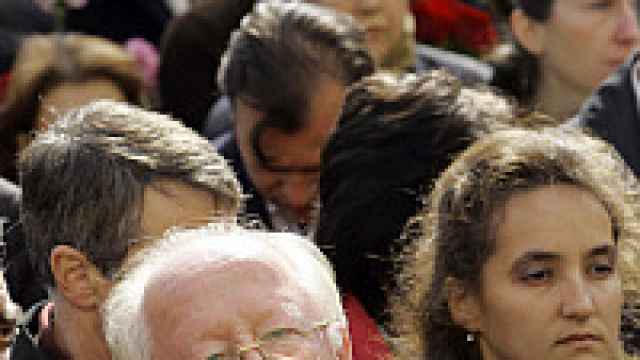 Dmitry Lovetsky / AP Viktor Gerashchenko, ex-Central Bank chief, on Saturday | |
Police said that one weapon found near the scene was an air pistol converted to fire standard bullets. Kommersant reported Saturday that a silencer had fallen off one of the guns.
A short, heated exchange between Kozlov and his attackers preceded the shooting, the source told Kommersant, indicating that they were inexperienced or attempting to rob him.
Kozlov's assassination led to a flurry of speculation in the media. Izvestia opined in its Friday edition that the killing might be have been linked to the closure of Sodbiznesbank and Kredittrust, which the Central Bank accused of money laundering.
Valery Miroshnikov, first deputy head of the Deposit Insurance Agency, a state-owned corporation, dismissed Izvestia's theory that an outraged account holder in one of the banks was behind the murder as "nonsense."
"A lot of depositors were hurt, but they were relatively small," Miroshnikov said Friday. "And it was two and a half years ago." Miroshnikov said that in his experience, account holders' anger usually died down within six months to a year after the loss of their savings.
Natalia Orlova, chief economist at Alfa Bank, agreed with Miroshnikov. "Two years is a lot of time to pass before an event like this," she said. "Sodbiznesbank and Kredittrust were simply the most public and well-known cases in which Kozlov was involved."
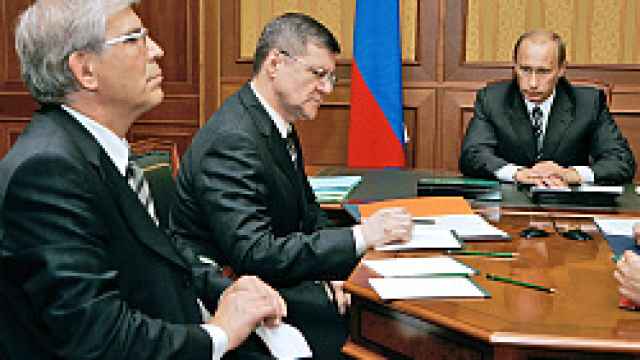 Dmitry Astakhov / Itar-Tass Ignatyev, Chaika and Putin holding an emergency meeting in Sochi on Friday. | |
Sodbiznesbank was a small bank compared to some of the 83 banks that the Deposit Insurance Agency is currently liquidating, he added.
"Either very big money or very serious revenge" was behind the killing, Miroshnikov said.
Recent changes introduced by the Central Bank made it unprofitable to acquire a bank for money-laundering purposes, Miroshnikov said. A bank found guilty of money laundering now loses its license within one month, whereas previously it could have stayed in business for six months, he said.
Kozlov was working to tighten up regulations further. Most recently, he proposed barring for life those found guilty of money laundering from working in the banking industry.
Kommersant ventured that banks involved in illegal import schemes might be behind the killing.
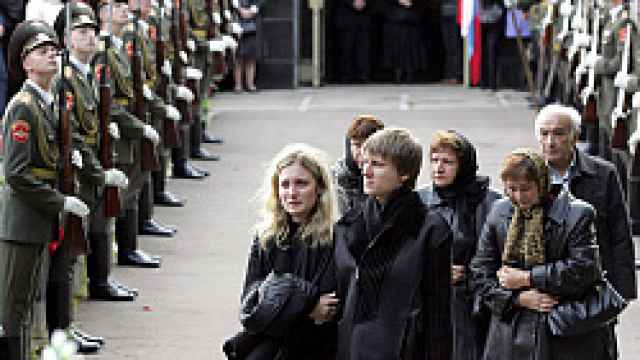 Sergei Karpukhin / Reuters Relatives of Kozlov following his coffin during the funeral service in Moscow. | |
The illegal transactions performed by the banks could have been worth at least $16.2 billion in the last two years, Kommersant reported.
Svetlana Petrenko, a spokeswoman for the City Prosecutor's Office, declined to comment on Kommersant's claim that someone close to Kozlov told the murderers about his schedule.
"I will not comment on what journalists have dreamed up," she said. "I can only say that the investigation is under way, and that several scenarios -- including one related to his professional activities -- are being pursued."
Petrenko also refused to comment on Izvestia's theory involving Sodbiznesbank and Kredittrast.
Staff Writers Miriam Elder, Maria Levitov and Anatoly Medetsky contributed to this report.
A Message from The Moscow Times:
Dear readers,
We are facing unprecedented challenges. Russia's Prosecutor General's Office has designated The Moscow Times as an "undesirable" organization, criminalizing our work and putting our staff at risk of prosecution. This follows our earlier unjust labeling as a "foreign agent."
These actions are direct attempts to silence independent journalism in Russia. The authorities claim our work "discredits the decisions of the Russian leadership." We see things differently: we strive to provide accurate, unbiased reporting on Russia.
We, the journalists of The Moscow Times, refuse to be silenced. But to continue our work, we need your help.
Your support, no matter how small, makes a world of difference. If you can, please support us monthly starting from just $2. It's quick to set up, and every contribution makes a significant impact.
By supporting The Moscow Times, you're defending open, independent journalism in the face of repression. Thank you for standing with us.
Remind me later.


